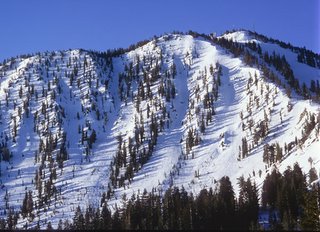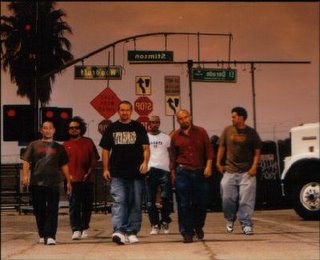I read on the front page of the San Francisco Chronicle that there's a
massive migration from the Bay Area to Reno. Well thanks for noticing, guys. It's actually been going on for years now. I guess you all were bound to catch on eventually.
Look, I love San Francisco and Northern California, and I'm glad that one of my favorite downtown hangouts,
EJ's Jazz Cafe, gets a lot of good publicity in the article, but after reading it I just can't seem to wash the stench of bloated arrogance out of my clothes and hair. Although they throw a few bones our way, the condescention is obvious. Reno is described as an area well known for "
gambling, divorce and women with big hair", and sure, they then go on to say that this is an image Reno is starting to overcome, but the strong implication is that our rise out of White Trash Hell is pretty much thanks to those self-same Bay Area refugees:
"While people in Nevada have always looked to San Francisco, people from San Francisco are looking east, and they're bringing their wealth, their ideas and their energy," said Mike Reed, dean of the business school at the University of Nevada at Reno. "They're changing northern Nevada."I usually try to avoid jumping on the anti-California Refugee bandwagon--I myself moved to Reno as an adult in 2001 (from Washington state, if it matters), and I love it for the same reasons the new arrivals do: The mountains, the unspoiled lakes and rivers, the four-season climate and the small-town (or relatively small-town) pace of life. I know nothing is worse than a guy who runs up into the treehouse and then tries to pull the ladder up after him, so let me be clear that I am NOT anti-growth.
However, the Chronicle article is written from the smug point of view of someone who's just "discovered" a wonderful place to live and comes rushing in without a seconds thought as to what his actions and the actions of those like him are doing to those who already live, work and have a life in his "new" paradise. Wouldn't it be better, even in a paper that serves San Francisco readers, to make a serious attempt at understanding what affects this massive migration is having on the affected region? I mean besides a throwaway paragraph at the end of the article that sort of laughs off local concerns over "Californication" as "
predictable as July heat"? Cities all over the West, from Portland to Denver to Albuquerque, have been dealing with this issue for years. It's time for all those fleeing the Golden State to start taking seriously the aggrivation that they can cause when they explode into yet another "Hot Town."
I'll be the first to say that there are a lot of pluses to an influx of humanity from the Bay Area. Most notably, this city is finally starting to get over the notion that the universe begins and ends with casino gambling and realizing that we actually are a real community with a lot to offer besides sad topless shows and cheap buffets. The area is becoming more culturally diverse, more enlightened philosophically and, much to my pleasure, more of a politically "blue-friendly" island in a red state--I'm happy that I still see a lot of John Kerry bumper stickers around town these days, and that you can chose to listen to Al Franken on the radio instead of having a "choice" between Rush Limbaugh or one of his dozens of clones.
But the mass-migration isn't without it's downside. Local salaries are not rising to keep up with the skyrocketing cost of living, and an entire generation of Nevadans, hardworking tax-paying citizens, may be permanently shut out of the housing market because real estate developers can make too much money selling McMansions like these to San Jose retirees:
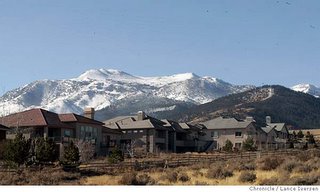
These ostentatious homes on the south end of town, selling for well over half a million dollars in a lot of cases, could never be bought by your average Reno household with it's 47,000 a year income, and they have driven property values into the stratosphere in the last few years. But the problems don't end with inflated housing costs. Driving to from one end of town to the other now takes about three times longer than it used to because of traffic snares and bottlenecks. Local resources suffer a much greater strain than is commonly realized, particularly law enforcement. And yes, the once-pristene environment that we all treasure is constantly underthreat by developers looking for a quick buck. It would be nice if our new neighbors would consider these things; instead, the San Francisco Chronicle says that our new residents seem to have a different set of priorities.
"Some complain that there are few good wine stores, places to buy organic meats and vegetables, and even fewer dining choices. Shopping is hardly a strong suit, either: Earlier this year, Bay Area transplants were abuzz about the mere possibility that Nordstroms would open its first store in the area.
Natalie Sellers and Carol Wilson have been trying to update the cuisine scene since 2000, when they opened 4th Street Bistro, a California-Mediterranean restaurant in an old house, complete with a wood-burning fireplace.
"She's made the farmers' market better," Wilson, the bistro's manager, said of Sellers, the chef. "They didn't know how to pronounce 'arugula' before. Now they know.""
I guess we should be grateful, huh?
Growth in Reno is both inevitable and positive. We welcome recent arrivals, but I think it's fair that they remember two things. One, their good fortune may make life more difficult in very real ways for those who already live in and contribute to this community and can't pay cash for oversized homes. Ostentatious displays of wealth or arrogance will inevitably lead to resentment from locals. Two, it isn't very healthy to think of the people who's neighborhood YOU JUST CHOSE TO MOVE TO as backwards hicks. The fact that someone doesn't know how to pronounce "arugula" doesn't make them ignorant, it just means they have a different set of priorities than you do. Anyway, you knew this wasn't Walnut Creek (Thank God!) when you moved here, so quit complaining. Keep those two things in mind, and I think we'll all be a lot happier.
 The above picture was taken just outside my front door on Arlington Avenue looking at the intersection of Arlington and First at about 11 a.m., just as we'd finished sandbagging the building.
The above picture was taken just outside my front door on Arlington Avenue looking at the intersection of Arlington and First at about 11 a.m., just as we'd finished sandbagging the building. This is Roff Avenue just behind the building. On the left you can see the lamppost I wrote about a couple of posts back, the desk chair still sitting vigil about two-thirds of the way up.
This is Roff Avenue just behind the building. On the left you can see the lamppost I wrote about a couple of posts back, the desk chair still sitting vigil about two-thirds of the way up. I went up to the large patio on the fourth floor of my building this morning and got the above picture of sandbags being delivered to Java Jungle and my favorite wine bar, Jungle Vino. As I look out the observation deck of the Fortress of Solitude right now, the water has receded quite a bit since the time this picture was taken.
I went up to the large patio on the fourth floor of my building this morning and got the above picture of sandbags being delivered to Java Jungle and my favorite wine bar, Jungle Vino. As I look out the observation deck of the Fortress of Solitude right now, the water has receded quite a bit since the time this picture was taken.  This is another view of the intersection outside my building with the swollen Truckee River in the background.
This is another view of the intersection outside my building with the swollen Truckee River in the background.  This picture was taken just a few minutes ago on First Street just outside Java Jungle. You can see how much the water has receded already.
This picture was taken just a few minutes ago on First Street just outside Java Jungle. You can see how much the water has receded already. 







 And because I haven't been posting enough pictures of her lately (and because she got me the digital camera with which these pictures were taken), here's a nice one of Melissa:
And because I haven't been posting enough pictures of her lately (and because she got me the digital camera with which these pictures were taken), here's a nice one of Melissa:
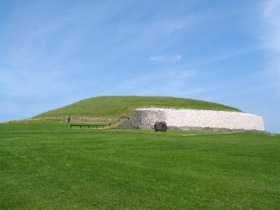

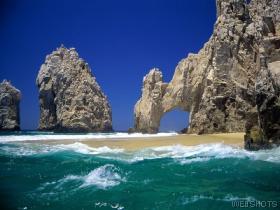


 We haven't managed to capture the mastermind of the murder of almost 3,000 Americans, but we sure are getting good at nailing his number 3 guy. Lets hear it for the triumph of lowered expectations!
We haven't managed to capture the mastermind of the murder of almost 3,000 Americans, but we sure are getting good at nailing his number 3 guy. Lets hear it for the triumph of lowered expectations!
